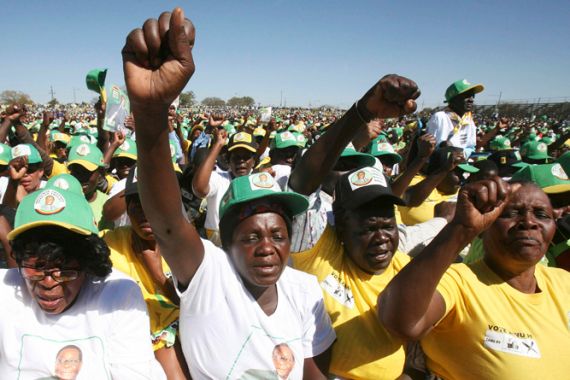Explainer: Elections in Zimbabwe
A look at candidates and campaign tactics in what many describe as Zimbabwe’s closest election ever.

There is a lot at stake in an election many are describing as the closest in Zimbabwe’s history.
The country, reduced to its knees in 2008 by an ill-fated economic meltdown, must choose between consolidating the gains of the last five years, or descend into the chaos of the 2000s, that made it a pariah state on the continent.
After five uncomfortable but stable five years of being led by a coalition government mainly composed of Robert Mugabe’s Zanu-PF and Morgan Tsvangirai’s MDC, Zimbabweans are hoping the elections on July 31 will take the country past the bickering, confusion and indecision that characterised the Government of National Unity.
The Movement for Democratic Change (MDC) and Zimbabwe African National Union Patriotic Front (ZANU-PF) entered a coalition in 2009 after a disputed and violent 2008 presidential election that left more than 200 dead and shattered the country’s economy.
But with the improved stability, and economic gains that have put groceries back on to store shelves and reduced inflation to a single digit after scaling the summits of 231 million percent in 2008, millions of Zimbabweans, both at home and in the diaspora, feel the country might have just turned the corner.
But will their elected representatives allow the improvements to simmer?
| CANDIDATES |
Four candidates will compete for the presidency though it is still firmly a two-horse race between Mugabe, 89, and Tsvangirai, 61, for the country’s top job.
Tsvangirai’s reputation, marred by a series of personal scandals, still remains at the heart of the opposition party’s efforts to dethrone Mugabe. In fact, as head of state since the country’s independence, Mugabe has never faced a more a resilient foe than Tsvangirai who competes against him for the third successive time, in a political career already spanning 13 years.
Mugabe, running for this eighth term in office, remains in remarkable health despite reports of him suffering complications, including prostrate cancer.
Though he would be eligible to run for one more election in 2018, at the age of 95, many see these elections as his swan song to a controversial career spanning more than three decades.
| CAMPAIGN PROMISES |
The elections are about more than the candidates and as far principles go, the MDC and Zanu-PF are poles apart.
Zanu-PF, illuminated by Mugabe’s final speech on Sunday, are vehement over their policies of indigenisation, redress and the transformation of the Zimbabwean economy through the promotion of black ownership.
In contrast, Tsvangirai’s MDC party is against the policy it calls “predatory accumulation” and sees foreign investment and the expansion of the economy as the only way to overcome the isolationist economic policies of the Mugabe era.
In many ways, when voters head to the polls, the MDC will be fighting a socio-political structure built on the back of a liberation movement, refusing to budge on the gains of an elite few.
| SCENARIOS |
The coalition government has managed to stall runaway inflation and brought a semblance of economic order confirmed by MDC’s credibility in the international arena.
But given the improved socio-economic conditions and macro-stability, even if slight, popular resentment against Mugabe has eroded.
While urban folk speak of change, apathy among the youth and the urban electorate is perhaps Tsvangirai’s biggest challenge, as a “hopeless” sentiment reigns supreme in large part.
Tsvangirai, after all, won the 2008 elections but found himself wanting under the Global Political Agreement,
facilitated by the Southern African Development Community to solve the deadlock between Mugabe and Tsvangirai.
Add the private “shenanigans” of Tsvangirai and his party’s inability to meet the exceptionally high expectations of its electorate, and Mugabe is once again a serious challenger.
In fact, it is difficult to see any party winning outright, but even harder, given the huge organs and apparatus at his disposal, to imagine Mugabe losing this election.
With so much to lose, Zanu-PF is desperate to secure victory and groom the unspeakable: a successor. In contrast, and despite its support base, the MDC is still merely hoping to eject Mugabe, as opposed to offering significant policy alternatives.
If they have secured the vote of the undecided and apathetic remains to be seen.
Both parties have repeatedly rejected violence and though the lead-up to the elections have been relatively peaceful, significant question marks remain voter roll manipulation, intimidation in outlying areas and purposeful obstruction to information.
While the African Union have endorsed the country’s preparations for the polls, with both parties unlikely to budge, the likelihood of a disputed poll is almost certainly on the cards.